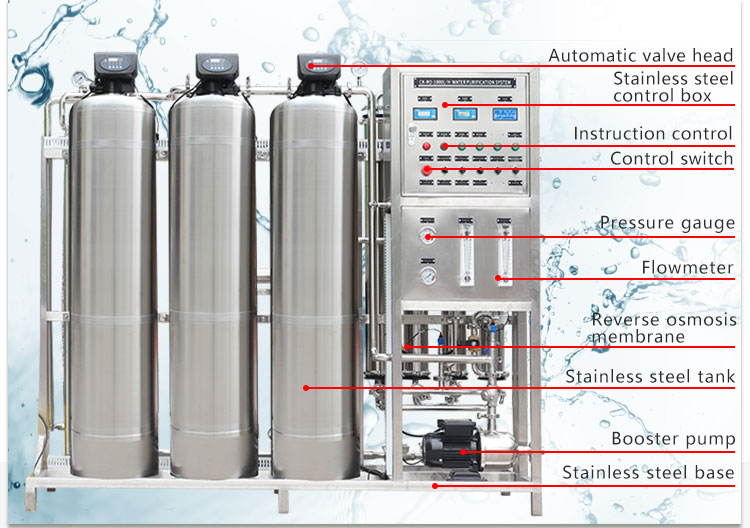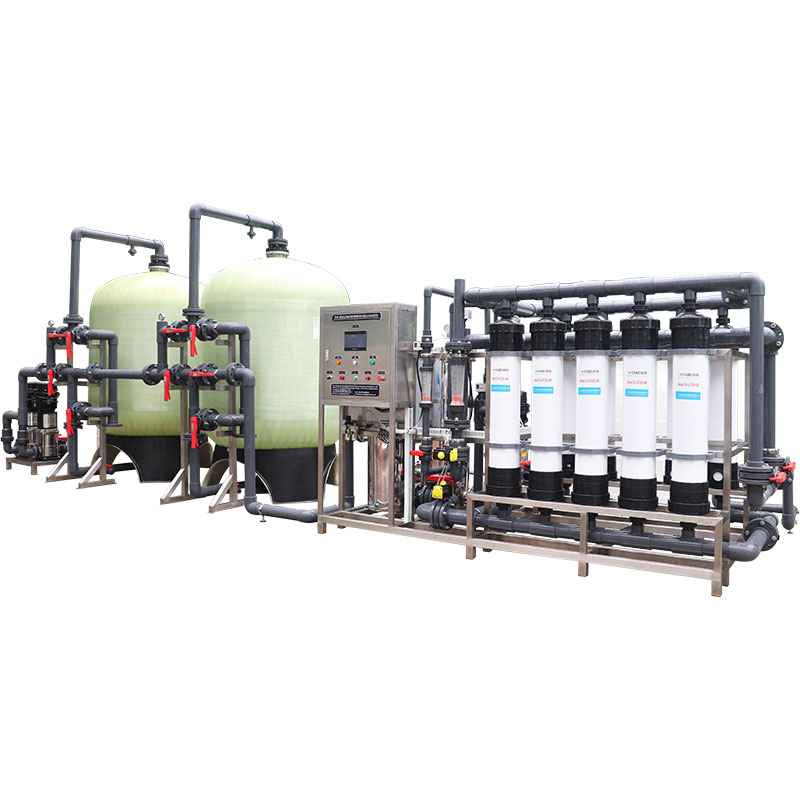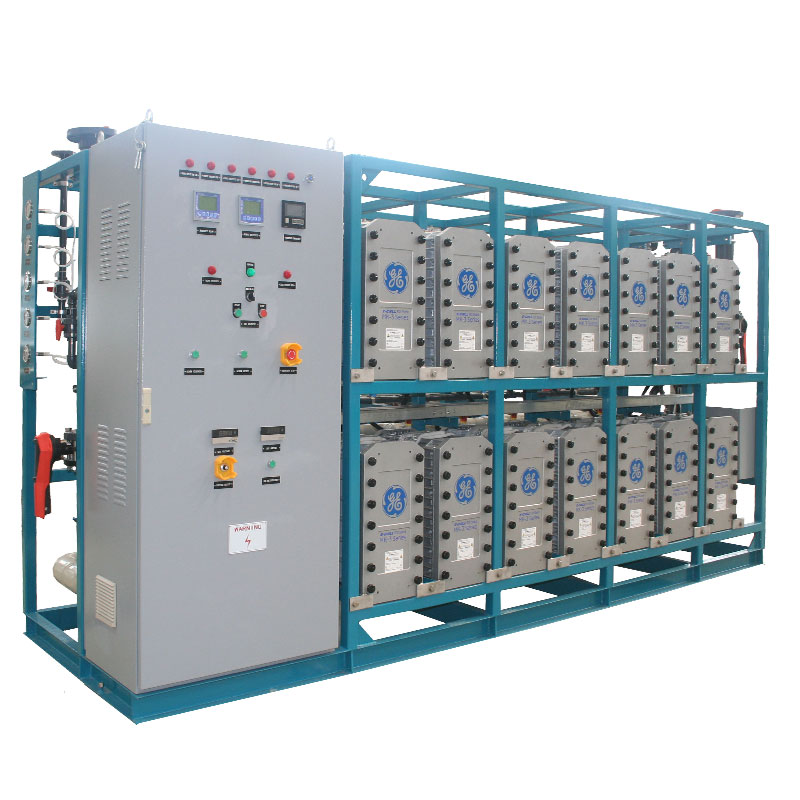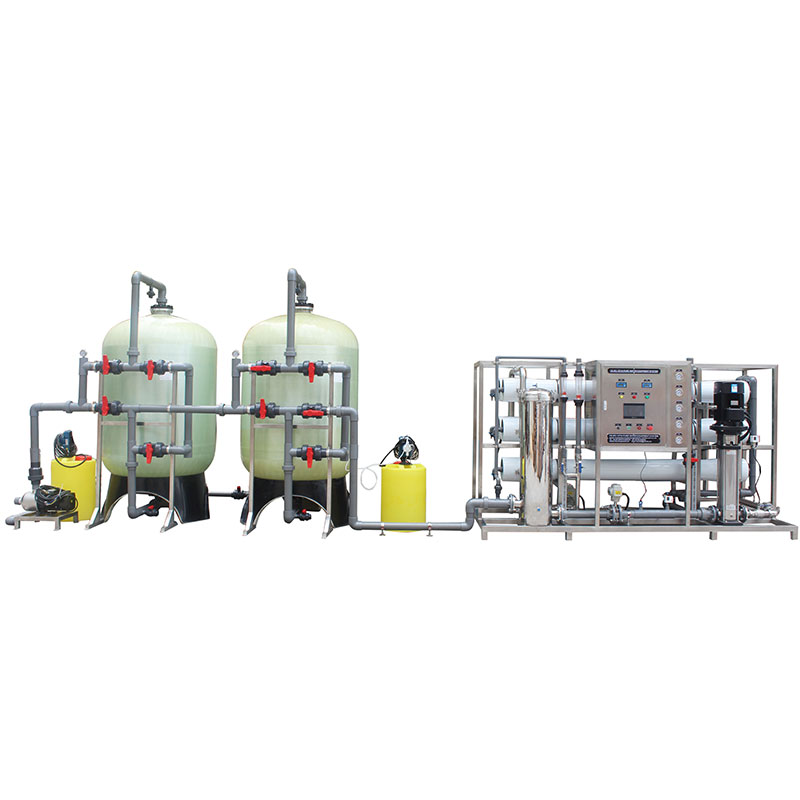Apa saja jenis mesin penyaring air?
Filter airadalah perangkat yang meningkatkan kualitas air dengan membuang kotoran, zat tersuspensi, dan polutan dari air. Seiring meningkatnya permintaan masyarakat akan air minum yang sehat, filter air telah menjadi peralatan penting di bidang rumah tangga, industri, dan komersial.
Akan tetapi, ada banyak jenis filter air, dan prinsip kerja serta skenario aplikasinya pun berbeda-beda. Artikel ini akan membahas secara terperinci jenis-jenis utama filter air dan berbagai bidang aplikasinya untuk membantu pembaca lebih memahami fungsi dan penerapan perangkat ini.

Apa saja jenis filter air yang ada?
Jenis utama filter air:
1. Filter mekanis
2. Filter karbon aktif
3. Saringan osmosis terbalik
4. Saringan sinar ultraviolet
5. Filter ultrafiltrasi
6. Filter keramik
7. Pelembut air
8. Elektroliser
1. Filter mekanis
Filter mekanisadalah jenis penyaring air paling dasar, yang menyaring zat tersuspensi besar dan kotoran dari air melalui penghalang fisik. Penyaring mekanis biasanya menggunakan saringan atau kain penyaring, dan saat air mengalir, partikel akan tertahan dan air bersih akan mengalir keluar. Ukuran pori penyaring ini dapat disesuaikan dengan kebutuhan. Metode yang umum digunakan meliputi penyaringan kasar dan penyaringan halus.
● Bidang aplikasi: Filter mekanis banyak digunakan dalam pengolahan air industri, pertanian, dan kota, dan cocok untuk menghilangkan partikel dan sedimen yang lebih besar. Pra-filter di rumah juga merupakan filter mekanis, yang digunakan untuk memurnikan air keran terlebih dahulu.
2. Filter karbon aktif
Filter karbon aktif menggunakan daya serap karbon aktif yang kuat untuk menghilangkan bahan organik, sisa klorin, bau, dan beberapa logam berat dalam air. Filter karbon aktif biasanya berupa karbon aktif granular atau blok. Saat air mengalir, polutan diserap pada permukaan karbon aktif, sehingga mencapai tujuan pemurnian kualitas air.
● Bidang aplikasi: Filter karbon aktif banyak digunakan dalam pemurni air rumah tangga, peralatan pemurni air portabel, dan sistem pengolahan air minum, dan sangat cocok untuk menghilangkan bau, sisa klorin, dan polutan organik dalam air. Selain itu, filter karbon aktif juga digunakan dalam bidang industri dan komersial untuk mengolah air proses dan air limbah.
3. Saringan osmosis terbalik
Filter reverse osmosis adalah perangkat penyaringan berefisiensi tinggi yang menghilangkan garam terlarut dan bahan organik molekuler kecil dalam air melalui membran semipermeabel. Ukuran pori membran reverse osmosis sangat kecil, yang dapat menghilangkan sebagian besar polutan terlarut, seperti logam berat, bakteri, virus, dan garam terlarut.
● Bidang aplikasi: Filter reverse osmosis banyak digunakan dalam pemurnian air minum rumah tangga, sistem pemurnian air komersial kelas atas, desalinasi air laut, dan persiapan air murni laboratorium. Efisiensi penyaringannya yang tinggi menjadikannya alat penting untuk mengolah sumber air yang sangat tercemar dan menyediakan air dengan kemurnian tinggi.
4. Saringan UV
Filter UV menggunakan lampu UV untuk memancarkan sinar ultraviolet dengan panjang gelombang tertentu guna menonaktifkan bakteri, virus, dan mikroorganisme lain di dalam air. Sinar ultraviolet tidak mengubah komposisi kimia air, tetapi hanya menghancurkan DNA mikroorganisme dan membuatnya kehilangan kemampuan reproduksinya, sehingga tujuan disinfeksi tercapai.
● Bidang aplikasi: Filter UV terutama digunakan pada situasi yang membutuhkan kualitas air berstandar tinggi, seperti sistem air minum rumah tangga, pengolahan air industri, disinfeksi kolam renang, dan air rumah sakit. Filter ini sering digunakan dalam kombinasi dengan jenis filter lain untuk memastikan pemurnian kualitas air yang menyeluruh.
5. Filter ultrafiltrasi
Filter ultrafiltrasi menggunakan ukuran pori-pori kecil dari membran ultrafiltrasi untuk mendorong air melalui membran dengan tekanan, sehingga dapat menyaring zat tersuspensi, koloid, bakteri, dan beberapa virus dalam air. Ukuran pori membran ultrafiltrasi biasanya antara 0,01 dan 0,1 mikron, yang secara efektif dapat menghilangkan partikel kecil dan beberapa zat berbahaya.
● Bidang aplikasi: Filter ultrafiltrasi banyak digunakan dalam pemurni air rumah tangga, pengolahan makanan, produksi farmasi, dan persiapan air laboratorium. Filter ini secara efektif menghilangkan mikroorganisme berbahaya sekaligus mempertahankan mineral bermanfaat dalam air, dan merupakan perangkat penyaringan yang sangat baik.

6. Filter keramik
Filter keramik menggunakan bahan keramik berpori sebagai media filter untuk menghilangkan zat tersuspensi, bakteri, dan partikel kecil lainnya dalam air melalui intersepsi fisik. Filter keramik tahan lama, dapat dicuci, dan digunakan kembali, dengan akurasi penyaringan yang tinggi.
● Bidang aplikasi: Filter keramik sering digunakan dalam pemurni air portabel rumahan, peralatan pemurnian air darurat, dan beberapa solusi pemurnian air berbiaya rendah. Karena tidak memerlukan listrik dan bahan kimia, filter keramik juga sangat populer di daerah terpencil dan kegiatan luar ruangan.
7. Pelembut air
Pelembut air menghilangkanion kalsium dan magnesium dari air melalui resin penukar ion, sehingga mengurangi kesadahan air. Ion kalsium dan magnesium dalam air sadah mudah membentuk kerak pada pipa dan peralatan. Peran pelembut air adalah untuk menghindari fenomena ini, memperpanjang umur peralatan, dan meningkatkan kenyamanan air.
● Bidang aplikasi: Pelembut air terutama digunakan di rumah dan industri, terutama di daerah dengan air keras, di mana pelembut air merupakan peralatan penting. Pelembut air dapat melindungi peralatan rumah, boiler, dan peralatan industri dari kerak dan banyak digunakan dalam sistem binatu, mandi, pasokan air panas, dan air industri.
8. Elektroliser
Elektroliser menguraikan air keran menjadi air asam dan air alkali melalui proses elektrolisis. Air alkali diyakini dapat membantu menetralkan zat asam dalam tubuh, sehingga sering digunakan sebagai air minum yang menyehatkan; air asam dapat digunakan untuk disinfeksi dan pembersihan.
● Bidang aplikasi: Elektroliser terutama digunakan dalam sistem air minum rumah tangga, dan sangat disukai oleh konsumen yang memperhatikan air minum yang sehat. Di bidang komersial, beberapa restoran dan salon kecantikan juga menggunakan elektroliser untuk menyediakan kualitas air tertentu guna memenuhi kebutuhan pelanggan.

Analisis area aplikasi berbagai jenis filter air
Meskipun filter air di atas dapat memurnikan kualitas air, berbagai jenis filter memiliki penerapan yang berbeda di area aplikasi tertentu. Perbedaan ini terutama bergantung pada polusi sumber air, tujuan penyaringan, dan persyaratan standar kualitas air.
1. Pemurnian air rumah tangga
Tujuan utama pemurnian air rumah tangga adalah untuk memastikan keamanan dan kesehatan air minum. Karena sebagian besar air rumah tangga berasal dari air ledeng kota, sumber air ini biasanya telah diolah sampai batas tertentu, tetapi untuk lebih meningkatkan kualitas air, peralatan penyaringan rumah tangga biasanya perlu menggabungkan beberapa teknologi penyaringan.
● Peralatan yang disukai: filter reverse osmosis, filter karbon aktif, filter ultrafiltrasi.
● Karakteristik aplikasi: Perangkat ini dapat secara efektif menghilangkan sisa klorin, logam berat, mikroorganisme, dan bahan organik terlarut untuk memastikan kemurnian dan keamanan air minum rumah tangga.
2. Pengolahan air industri
Pengolahan air industrilebih kompleks karena keragaman industri dan alur proses yang terlibat, dan standar kualitas air yang dibutuhkan bervariasi dari satu proses ke proses lainnya. Misalnya, industri manufaktur elektronik membutuhkan air ultramurni dengan kemurnian yang sangat tinggi, sementara pengolahan makanan membutuhkan air olahan untuk menghilangkan polutan tertentu.
● Peralatan yang disukai: filter reverse osmosis, filter ultrafiltrasi, pelembut air, filter mekanis.
● Karakteristik aplikasi: Filter industri biasanya perlu memproses air dalam jumlah besar dan perlu memastikan kualitas air yang stabil, sehingga daya tahan dan kapasitas pemrosesan peralatan menjadi pertimbangan utama.
3. Air pertanian dan irigasi
Kebutuhan utama air pertanian dan irigasi adalah untuk membuang partikel tersuspensi dalam air dan mencegah sistem irigasi tersumbat. Karena konsumsi air pertanian besar dan persyaratan kualitas air relatif rendah, fokus desain filter adalah untuk memproses aliran air besar secara efisien dan mengurangi biaya perawatan.
● Peralatan yang disukai: filter mekanis, filter ultrafiltrasi, pelembut air.
● Karakteristik aplikasi: Filter ini dapat secara efektif menghilangkan partikel besar, melindungi peralatan irigasi, dan memastikan pertumbuhan tanaman normal.
4. Air kota dan komersial
Pengolahan air kota dan komersial terutama melibatkan pemurnian sumber air berskala besar untuk memenuhi standar kesehatan masyarakat dan air minum. Karena penggunaan yang besar dan persyaratan kualitas air yang tinggi, pengolahan air kota dan komersial biasanya menggunakan sistem penyaringan multi-tahap.
● Peralatan yang disukai: filter reverse osmosis, filter karbon aktif, filter mekanis, filter ultraviolet.
● Karakteristik aplikasi: Perangkat ini digunakan dalam kombinasi untuk memastikan bahwa sistem pasokan air kota dan sistem air komersial menyediakan kualitas air yang aman dan bersih, cocok untuk berbagai keperluan minum dan industri.
5. Skenario aplikasi khusus
Beberapa skenario spesifik seperti laboratorium, restoran kelas atas, institusi medis, dll. memiliki persyaratan yang sangat tinggi untuk kualitas air dan biasanya memerlukan penggunaan sistem penyaringan yang dirancang khusus.
● Peralatan yang disukai: filter reverse osmosis, elektroliser, filter ultrafiltrasi.
● Karakteristik aplikasi: Dalam skenario aplikasi ini, peralatan penyaringan air tidak hanya harus menyediakan air dengan kemurnian tinggi, tetapi juga memiliki stabilitas dan keandalan untuk memenuhi kebutuhan lingkungan khusus.

Kesimpulan
Ada berbagai jenis filter air, yang masing-masing memiliki prinsip kerja dan bidang penerapannya sendiri. Berdasarkan berbagai persyaratan penerapan, sangat penting untuk memilih peralatan penyaringan yang tepat guna memastikan bahwa kualitas air memenuhi standar dan memperoleh manfaat ekonomi. Baik di bidang rumah tangga, industri, pertanian, atau komersial, kombinasi dan penerapan peralatan ini secara wajar dapat mencapai hasil pengolahan air terbaik.






